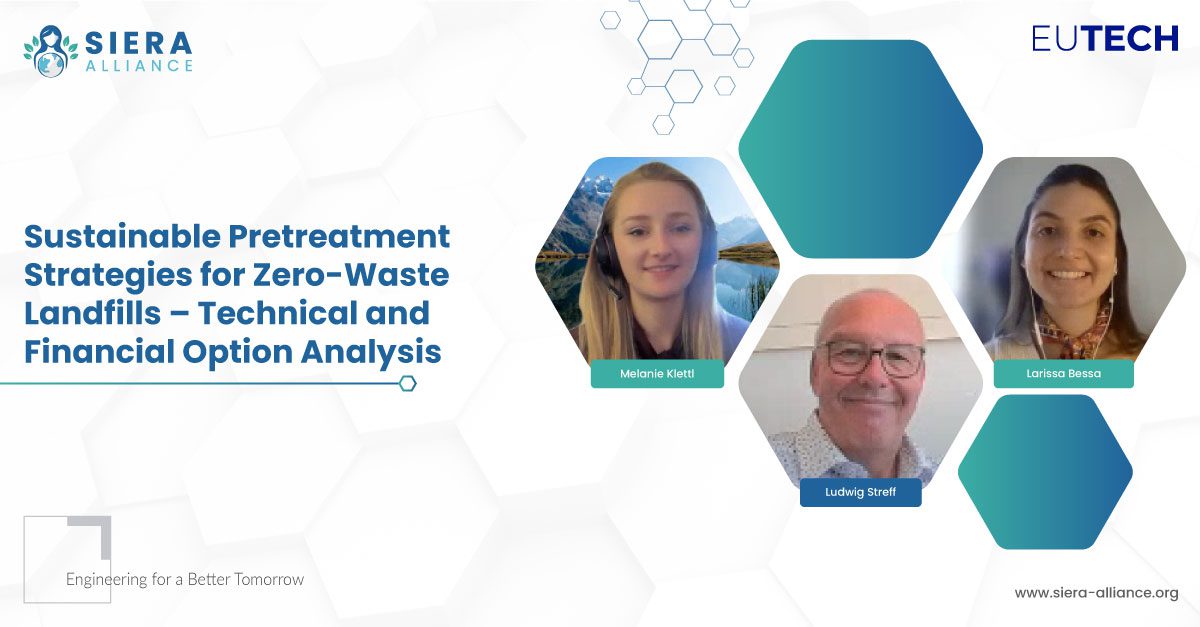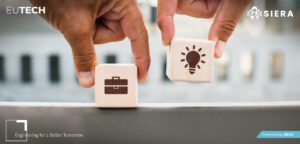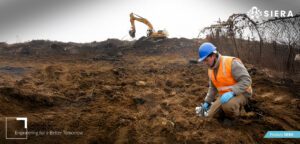Introduction: Transforming Landfill Management through Sustainable Pretreatment
Landfills have long been a necessary part of waste management systems worldwide, but as waste generation continues to rise and environmental impacts become more evident, the need for sustainable landfill management has never been more urgent. In line with the European Union’s Circular Economy Action Plan, the emphasis is now on zero-waste landfills that minimize environmental impact, extend landfill lifespan, and recover valuable resources.
In the SIERA Academy Impact Series webinar held on April 29, 2025, SIERA Alliance Members discussed key strategies for zero-waste landfills, focusing on sustainable pretreatment solutions. The session explored the technical and financial aspects of Mechanical Biological Treatment (MBT) and other pretreatment methods aimed at transforming waste management practices.
The challenge addressed in the webinar was highlighted through a real-world case in Georgia’s Adjara Region, where a landfill designed to handle 70,000 tons per year was forced to accommodate 160,000 tons annually, leading to overcapacity and shortened landfill life. This case illustrated the urgent need for pretreatment solutions to reduce landfill volume, enhance resource recovery, and mitigate environmental impacts.
Challenges in Sustainable Landfill Management
The Adjara Region case study provided critical insights into the challenges faced when landfills are overburdened and unable to meet growing waste demands. Key challenges include:
- Waste Volume Surge: The increasing quantity of waste being generated has led to rapid depletion of landfill space. Without pretreatment, the landfill’s operational lifespan is significantly reduced, leading to land-use conflicts and environmental risks.
- Regulatory Pressure: The EU Waste Framework Directive and Circular Economy Action Plan require member states to implement strategies for waste diversion, recycling, and resource recovery. However, many landfills still rely on outdated practices that fail to meet these regulations.
- Environmental Impact: Traditional landfills produce toxic leachate and greenhouse gas emissions. As waste decomposes anaerobically, methane emissions contribute to climate change, while leachate can contaminate local water supplies if not properly managed.
These challenges underscore the need for sustainable pretreatment methods that can address waste diversion, minimize emissions, and reduce the environmental footprint of landfills.
Opportunities from Sustainable Pretreatment Strategies
The implementation of Mechanical Biological Treatment (MBT) in landfills offers significant opportunities to optimize waste management, reduce emissions, and extend landfill lifetime. By integrating biological stabilization and sorting technologies, waste is diverted from landfills, increasing recycling rates and producing Refuse Derived Fuel (RDF) for industrial use. These strategies not only address regulatory requirements but also unlock cost-saving opportunities while enhancing the social and environmental resilience of landfill operations.
Opportunities Summary
| Opportunity | Benefit |
| Extended Landfill Lifespan | Extends the operational life of landfills, reducing the need for frequent landfill extensions. |
| Waste Diversion | Significantly reduces the amount of waste sent to landfills by recovering recyclables and producing RDF. |
| Emissions Reduction | Minimizes methane and leachate emissions through biological treatment and waste stabilization. |
| Operational Cost Savings | Reduces operational costs by lowering the volume of waste sent to landfills and reducing landfill extension requirements. |
| Financial Savings | Reduces future investments in landfill extension and new landfill cells. |
| Regulatory Compliance | Supports alignment with EU regulations for waste management, including Circular Economy goals and ESG disclosures. |
| Social Impact | Prevents the need for population resettlement due to landfill expansions, promoting social sustainability. |
Proposed Solutions: Sustainable Pretreatment for Zero-Waste Landfills
The webinar explored various pretreatment strategies and their potential to transform landfills into sustainable, zero-waste facilities. SIERA Alliance Members provided an in-depth analysis of different technical and financial options, with a focus on the following solutions:
1. Mechanical Biological Treatment (MBT)
MBT is a sustainable pretreatment method that combines mechanical sorting with biological stabilization to reduce landfill volume and improve resource recovery. The process involves:
- Sorting recyclables: Recovering valuable materials such as plastics, metals, and paper for recycling.
- Biological stabilization: Treating organic waste through processes like bio-stabilization or bio-drying, which helps reduce methane emissions and leachate generation in landfills.
- RDF Production: In the bio-drying phase, Refuse Derived Fuel (RDF) can be produced for use in industries like cement production, reducing reliance on fossil fuels.
2. Material Recovery Facilities (MRF)
In some scenarios, a Material Recovery Facility (MRF) is integrated into the waste management process. MRF focuses on sorting recyclables from waste streams before landfill disposal. While not as comprehensive as MBT, MRFs contribute significantly to reducing landfill waste by recovering recyclables, such as paper, plastics, metals, and glass.
3. Scenario Analysis and Economic Feasibility
The webinar also included an economic analysis comparing different pretreatment options. The following scenarios were considered:
- Scenario 1 (Business as Usual – BaU): No pretreatment; all waste sent to landfill.
- Scenario 2 (MRF + Landfill): Implementation of a sorting facility (MRF) to recover recyclables, with the remaining waste sent to landfill.
- Scenario 3 (MBT + Landfill): Introduction of MBT with bio-stabilization and/or bio-drying, significantly reducing landfill volumes and extending landfill life.
Economic Analysis Results:
- CapEx (Capital Expenditures): The initial investment for MBT systems is higher than for basic MRF solutions, but over a 30-year period, MBT offers significant long-term savings due to reduced landfill volume and longer operational lifespan.
- OpEx (Operational Expenditures): MBT with bio-drying (Scenario 3B) shows a 14% cost reduction compared to basic MRF operations. The operational cost for a landfill without pretreatment is higher due to the need for more frequent landfill extensions.
4. Environmental Impact Reduction
MBT and MRF systems also offer significant environmental benefits:
- Emission Reduction: Both bio-stabilization and bio-drying processes significantly reduce methane emissions and leachate production, which are major contributors to landfill environmental impact.
- Landfill Extension Avoidance: By reducing the amount of waste sent to landfills, these systems prevent the need for frequent landfill extensions, thereby avoiding social impacts like resettlement of surrounding populations.
Case Study: Adjara Region, Georgia – A Real-World Example
The Adjara Region landfill case study in Georgia was used to illustrate the potential of sustainable pretreatment strategies in practice.
Initial Challenges:
- The landfill was designed for a capacity of 70,000 tons per year but faced a dramatic increase in waste generation, requiring a capacity of 160,000 tons per year.
- Without pretreatment, the landfill’s operational lifespan was reduced by 50%, resulting in land-use conflicts and environmental risks.
Proposed Solutions:
- The solution involved the installation of a Mechanical Biological Treatment (MBT) system that combines sorting recyclables with biological treatment to reduce waste volume and extend the landfill life.
- Various scenarios were analyzed to assess the impact on landfill lifetime, emissions reduction, and cost savings:
- Scenario 1 (Business as Usual): No treatment, leading to a reduction in the landfill’s lifespan.
- Scenario 2 (MRF + Landfill): Sorting recyclables before sending the remaining waste to the landfill.
- Scenario 3 (MBT + Landfill): With bio-stabilization or bio-drying, the waste diversion potential increased significantly, extending the landfill’s operational life by over 20 years.
Economic Impact:
- The initial investment for MBT was higher than for MRF, but the operational cost savings in the long term—combined with environmental benefits and longer landfill life—justified the higher upfront expenditure.
- Over a 30-year period, the MBT approach resulted in a 14% reduction in operational costs, making it a financially viable and sustainable option for landfill management.
Take the Next Step with SIERA
At SIERA Alliance, we specialize in delivering innovative landfill management solutions that align with EU circular economy principles and ESG goals. Our expertise in waste pretreatment, landfill diversion, and emissions reduction helps businesses, municipalities, and developers transform waste management systems while ensuring regulatory compliance.
Our services include:
- Sustainable Waste Pretreatment Systems: Customized Mechanical Biological Treatment (MBT) solutions that reduce landfill volume, recover recyclables, and extend landfill life.
- Circular Economy and Waste Diversion Strategies: We help clients implement Material Recovery Facilities (MRF) and RDF production to minimize waste sent to landfills, recover valuable resources, and contribute to climate goals.
- SustainSuite: Our software solution for real-time monitoring, impact tracking, and ESG reporting to optimize waste management operations and ensure compliance with EU regulations. Book a free demo today.
- Financial & Economic Analysis: We conduct economic feasibility studies to help you evaluate the cost-benefit analysis of different pretreatment strategies, considering both capital expenditures (CAPEX) and operational costs (OPEX).
- Tailored Consultation for Landfill Management: Our experts provide insights into landfill extension reduction, emission control, and resource recovery, ensuring that your landfill management strategies align with EU Circular Economy targets and maximize operational efficiency.
Get in touch with SIERA Alliance today to explore how our sustainable landfill solutions can help you reduce waste, enhance your ESG performance, and ensure compliance with the ESRS reporting standards. Our team of experts is ready to help you implement sustainable, financially viable strategies that support long-term environmental goals and circular economy practices.









